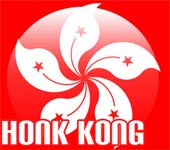Barred Hong Kong legislators travel to Macau to test travel bans
 Hong Kong - A group of pro-democracy Hong Kong legislators on Tuesday announced plans to try to enter Macau, where academics and politicians have been refused entry after a crackdown on so-called anti-China elements.
Hong Kong - A group of pro-democracy Hong Kong legislators on Tuesday announced plans to try to enter Macau, where academics and politicians have been refused entry after a crackdown on so-called anti-China elements.
The six members of the League of Social Democrats plan to take a ferry Sunday to the gambling resort west of Hong Kong to test the ban after a series of deportations.
The group also called on legislators who are barred from the former Portuguese colony to make daily trips by ferry to put pressure on Macau's Beijing-appointed government to lift the travel bans.
A number of pro-democracy politicians have been refused entry to Macau since December, and two academics who spoke out against national security laws being introduced in Hong Kong in 2003 have also been denied entry.
A Hong Kong photographer who was detained briefly in Beijing last year when a scuffle broke out over queues for Olympic tickets was also refused entry to Macau on security grounds.
Legislator Leung Kwok-hung, who is among those refused entry, said he would travel Sunday with five colleagues to test the travel bans.
"We will go there to emphasize our demand that the Macau government delete the blacklist," Leung said in an interview with Hong Kong's government-run radio station RTHK.
"It is ridiculous," he said. "I suggest those legislators who have been banned from entering Macau should go there on a daily basis and come back if we are rejected. It will become a daily protest.
"That way, it will become very difficult for the Macau government to [continue to] resist us. ... It is a very ugly act for a country to refuse to allow a legislator from another country to enter without a reason."
Macau is a 45-minute ferry ride from Hong Kong. and people barred from entry to the territory are usually turned away at immigration when they arrive and put on a ferry back to Hong Kong.
The travel bans have provoked fears that Macau, which like Hong Kong was a colony before reverting to Chinese rule in the 1990s, is taking a hard line on anyone it sees as being anti-China.
Macau introduced a national security law in February, which gives the government greater powers to act against people viewed as anti-China dissidents.
Macau was a Portuguese colony for 450 years before reverting to Chinese rule and has a reputation for being less enthusiastic than Hong Kong in maintaining press and personal freedoms.
Both Hong Kong and Macau have independent mini-constitutions, guaranteeing political freedoms and judicial independence under what are called "one country, two systems" arrangements with China.
Attempts to bring in national security laws in Hong Kong were abandoned after triggering anti-government protests involving 500,000 people at a time in 2003 and 2004. (dpa)